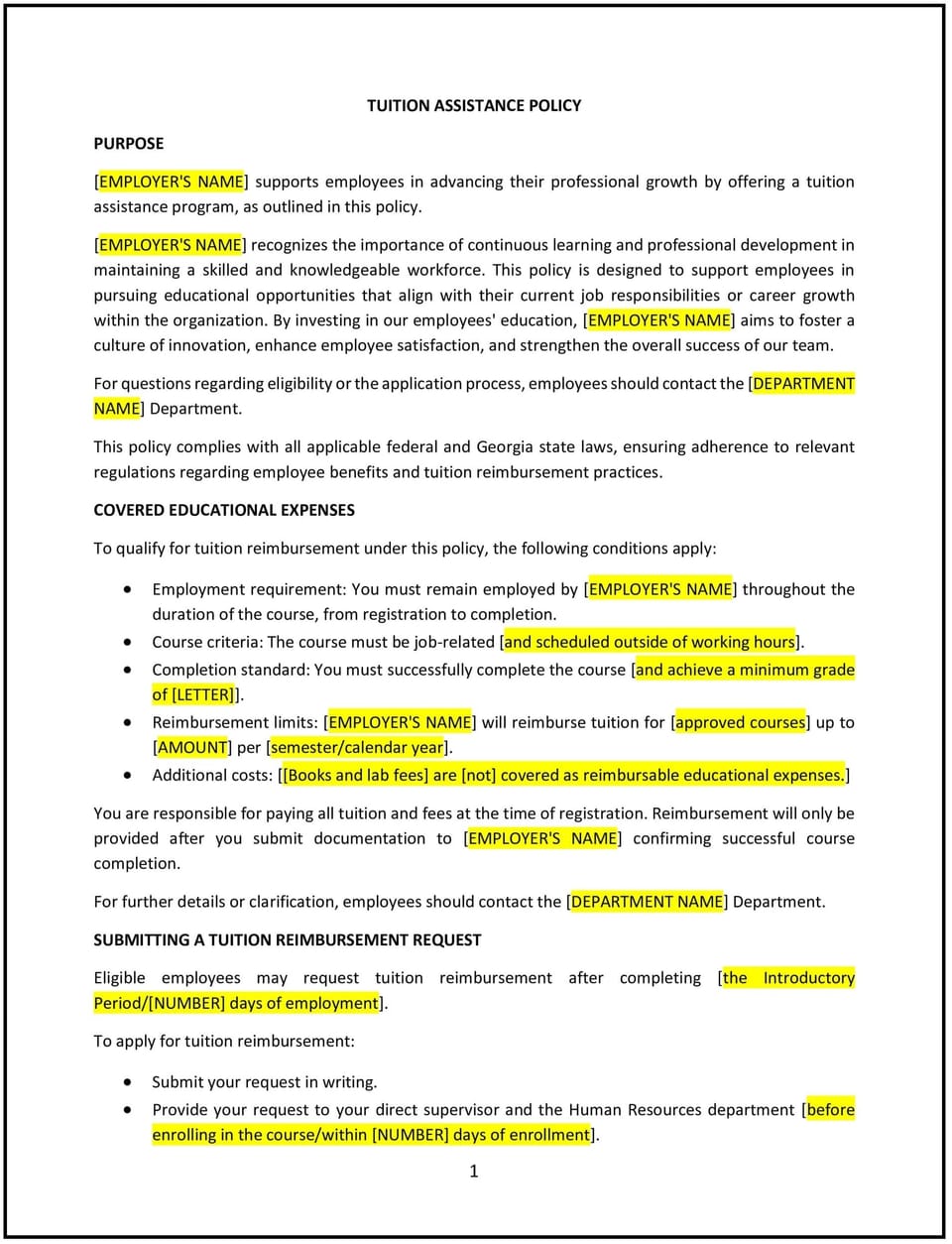Tuition assistance policy (Georgia): Free template

Tuition assistance policy (Georgia)
This tuition assistance policy is designed to help Georgia businesses support employees pursuing further education to enhance their skills and knowledge. The policy outlines eligibility, application procedures, and reimbursement guidelines to promote professional development and career growth.
By implementing this policy, businesses can invest in employee education, improve retention, and build a skilled workforce.
How to use this tuition assistance policy (Georgia)
- Define eligible programs: Specify the types of educational programs covered, such as degree courses, certification programs, or job-related training.
- Establish eligibility criteria: Outline the qualifications employees must meet to apply, such as tenure, performance history, or relevance of the program to their role.
- Set reimbursement limits: Clearly state the maximum financial assistance available per employee and any applicable caps per semester or year.
- Require pre-approval: Employees should seek approval from their manager or HR before enrolling in a program to qualify for assistance.
- Address repayment conditions: Specify circumstances where employees may need to repay assistance, such as leaving the business before a specified period.
- Outline documentation requirements: Require employees to submit proof of enrollment, grades, and receipts for tuition or related expenses.
- Review and update regularly: Periodically assess the policy to ensure alignment with Georgia-specific education trends and business needs.
Benefits of using this tuition assistance policy (Georgia)
Implementing this policy provides several advantages for Georgia businesses:
- Encourages professional development: Employees gain skills and knowledge that benefit their roles.
- Improves retention: Supporting education demonstrates a commitment to employee growth, fostering loyalty.
- Builds a skilled workforce: Employees can contribute more effectively with updated qualifications.
- Enhances reputation: Offering tuition assistance helps attract talent by showcasing the business as an employer of choice.
- Reflects Georgia-specific practices: Tailoring the policy to local educational resources ensures practicality and relevance.
Tips for using this tuition assistance policy (Georgia)
- Communicate opportunities: Share details about the policy with employees during onboarding and through internal channels.
- Encourage alignment: Ensure educational programs align with the employee’s role and organizational goals.
- Provide guidance: Offer support in selecting programs or navigating the application process for tuition assistance.
- Track progress: Monitor employees’ academic performance and participation in approved programs.
- Celebrate success: Recognize employees who complete their education, reinforcing the business’s commitment to development.
Q: What types of educational programs are eligible for assistance?
A: Eligible programs typically include degree courses, certifications, or training directly related to the employee’s job responsibilities.
Q: How should employees apply for tuition assistance?
A: Employees should submit a written request to their manager or HR, including details about the program, costs, and expected outcomes.
Q: What expenses are covered under this policy?
A: Covered expenses may include tuition, course materials, and mandatory fees, subject to the policy’s reimbursement limits.
Q: Is there a limit to the amount of assistance provided?
A: Yes, businesses should specify a maximum amount per employee per semester or year in the policy.
Q: Are employees required to maintain a certain grade to qualify for reimbursement?
A: Yes, employees should meet the minimum grade requirements outlined in the policy to remain eligible for assistance.
Q: What happens if an employee leaves the business after receiving tuition assistance?
A: Businesses may require employees to repay assistance if they leave within a specified period, as detailed in the policy.
Q: How often should this policy be reviewed?
A: The policy should be reviewed annually or as needed to reflect changes in Georgia education costs, workforce trends, or organizational priorities.
This article contains general legal information and does not contain legal advice. Cobrief is not a law firm or a substitute for an attorney or law firm. The law is complex and changes often. For legal advice, please ask a lawyer.


